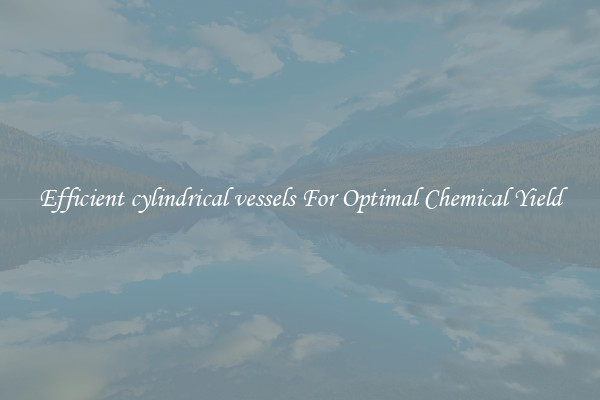Efficient cylindrical vessels For Optimal Chemical Yield
Efficient Cylindrical Vessels for Optimal Chemical Yield

In the field of chemical engineering, one of the key objectives is to maximize the yield of a chemical reaction. This is crucial for economic reasons, as well as for ensuring the sustainability and efficiency of the manufacturing process. One of the factors that can significantly impact the yield is the choice of vessel for the reaction. In this article, we will explore the benefits of using efficient cylindrical vessels for optimal chemical yield.
Cylindrical vessels, also known as reactors, offer several advantages over other types of vessels. First and foremost, their shape allows for efficient mixing of reactants. The cylindrical geometry promotes radial flow patterns, which ensures that all the reactants are evenly distributed throughout the vessel. This homogeneity of the reactant distribution minimizes the formation of local hotspots or zones with poor mixing, which can lead to incomplete reactions and lower yields.
Furthermore, cylindrical vessels have a large surface area-to-volume ratio. This means that a relatively small vessel can accommodate a large volume of reactants. The increased surface area allows for a more efficient heat transfer, which is particularly important for exothermic reactions. By effectively dissipating the heat generated during the reaction, the cylindrical vessel helps maintain the optimal temperature for the reaction to proceed and reach completion. This prevents the degradation or decomposition of the reactants, which can lead to lower yields.
Another advantage of cylindrical vessels is their scalability. Cylindrical reactors can be easily scaled up or down depending on the production requirements. This flexibility allows the manufacturing process to be tailored to different volumes, enabling efficient and cost-effective production across different scales. Additionally, cylindrical vessels are compatible with a wide range of agitation systems, allowing for further customization and optimization of the reaction conditions.
The design of cylindrical vessels also takes into consideration safety aspects. They are usually equipped with pressure and temperature sensors, as well as safety relief mechanisms, to ensure that the reaction can be controlled and monitored effectively. Furthermore, the cylindrical shape of the vessel allows for easy cleaning and maintenance, which is essential for maintaining optimal performance and preventing cross-contamination between different reactions.
In conclusion, the choice of vessel for chemical reactions plays a crucial role in achieving optimal chemical yield. Cylindrical vessels offer a range of advantages, including efficient mixing, high surface area-to-volume ratio, scalability, and safety. By utilizing these vessels, manufacturers can enhance the efficiency and sustainability of the production process, ultimately maximizing the chemical yield.

View details

View details

View details

View details








